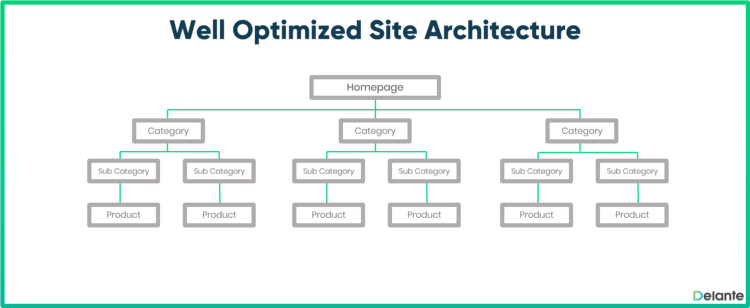Does My Site Architecture Influence SEO?
Absolutely yes. You see, your website architecture can make or break your SEO. Stating the obvious; it is one of the fundamentals which can determine your website’s rank in the Search Engines Results Pages (SERPs). When developing a website from an SEO perspective, consider two main things when it comes to website architecture: the users’ experience and the search engines “spiders” experience. Let us elaborate on this through the four major SEO factors influenced by your site architecture. So, keep on reading.Here are the 4 SEO Factors Influenced by Your Website Architecture
- User Experience
- Search Engines “Spiders” Experience
- Internal Link Authority
- Sitelinks in SERPs
What is Website Architecture?
Your website architecture, as you may already know, is the way your web pages are structured-from your home page to your category pages, to your product pages (if there are any), and to your recently published blog post. Now, let’s expand on how your site architecture influences your SEO. Let’s start with arguably the most essential factor:The User Experience
The search engines prioritize user experience, especially Google—they want to keep people using their browsers to keep the business going. In order to do this, they want you to keep your website at its fastest and easiest-to-navigate form so that users will have a pleasant experience. If your site isn’t quick and easy to deal with, they will not put your web pages on top of the SERPs. You see, people who are using your site must be able to find things quickly and easily so that they would have a great experience on your website. This convenience will not only help boost your user experience but also your SEO because happy users are more likely to link back to your website, they are the people who stay on your page for a long time and who do all sorts of positive signals that tell the search engines that your website is relevant and reputable-getting you more chances to rank higher on the SERPs.The Search Engines “Spiders” Experience
The search engine “spiders” or “crawlers” are arguably the second most important entities to consider when planning your site architecture for SEO. You see, the search engines “crawlers” are like hyperactive speed-readers, fast crawling from one web page to another, making copies of your website pages, and storing your pages in a massive book of the web, which is commonly known as “index”. So, when someone searches for a particular keyword, these “spiders” quickly flip through this massive index to find all the most relevant web pages and present the best ones on top of the results for the users to click and discover. Now, for your web pages to be on top of the SERPs, you need to make sure that it is easier for the search engines “crawlers” to find your website and crawl to each of your web pages so that they can index them. Remember that if your website architecture is well-interlinked, the “spiders” can crawl 100% of your web pages, following your interlinks. For instance, your website architecture should look like this: Also, it is important to remember that the search engines have some principles by which they crawl websites. Here are a couple of strategic things you can do to make your website architecturally-friendly for the search engines.
Also, it is important to remember that the search engines have some principles by which they crawl websites. Here are a couple of strategic things you can do to make your website architecturally-friendly for the search engines.
- Keep the user’s experience first-make sure that your website is easy-to-navigate so that your users don’t feel lost. At best, strive to not make them think about where to click next or what to search on your website. Everything should be simple and clear as daylight.
- Strive to link relevant pages within 3 to 4 clicks from the landing page
Internal Link Authority
Your website architecture, depending on how it is structured, can establish a good or bad link authority across your site. So, remember to create internal links to your high-priority web pages such as your home page and other category or catalog pages because the more internal links that are going to these important web pages are an indication to the search engines that they are your authority pages and should be ranked well.Sitelinks in the Search Engine Results Pages
Sitelinks are one of the most significant SEO advantages that you can have-these are a listing format in the SERPs that presents your website’s home page along with multiple internal links shown below the main page. Sitelinks often look like this: Sitelinks are vital in increasing your website’s navigability and your click-through rate (CTR) as well as your brand’s reputation. When people see your sitelinks in the SERPs, it improves their trust on your website because it helps them get to the most relevant information that you have for their query. Not to mention that sitelinks help you dominate the SERPs while shortening your conversion funnel.
Now, remember that unlike a structured data markup, sitelinks can happen automatically but only to the interlinked and authoritative websites. So, sitelinks are like awards by the search engines, especially Google, to websites with a well-structured site architecture for SEO.
If your website architecture is poorly planned and laid out, you are most likely losing valuable CTR, organic and highly-targeted traffic to your website, and conversions.
Sitelinks are vital in increasing your website’s navigability and your click-through rate (CTR) as well as your brand’s reputation. When people see your sitelinks in the SERPs, it improves their trust on your website because it helps them get to the most relevant information that you have for their query. Not to mention that sitelinks help you dominate the SERPs while shortening your conversion funnel.
Now, remember that unlike a structured data markup, sitelinks can happen automatically but only to the interlinked and authoritative websites. So, sitelinks are like awards by the search engines, especially Google, to websites with a well-structured site architecture for SEO.
If your website architecture is poorly planned and laid out, you are most likely losing valuable CTR, organic and highly-targeted traffic to your website, and conversions.













